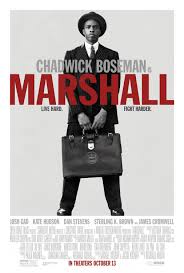Marshall
Posted on October 12, 2017 at 5:25 pm
B +| Lowest Recommended Age: | Mature High Schooler |
| Profanity: | Some strong language |
| Alcohol/ Drugs: | Alcohol, smoking |
| Violence/ Scariness: | Allegations of rape and attempted murder, fights and beatings, gun |
| Diversity Issues: | A theme of the movie |
| Date Released to Theaters: | October 13, 2017 |
| Date Released to DVD: | January 8, 2018 |

“It’s a real life Bigger Thomas,” says a character describing the new case assigned to a young lawyer named Thurgood Marshall (Chadwick Boseman). Bigger Thomas was the young black protagonist who could not escape the fundamental racism of American society in Richard Wright’s novel, Native Son, accused of rape and murder. In this real-life case, a black chauffeur named Joseph Spell (Sterling K. Brown of “This is Us”) was accused of rape and attempted murder of his employer, Eleanor Strubing (Kate Hudson), a wealthy Connecticut socialite. Marshall, then the entire legal staff of the NAACP, was going from town to town representing black defendants, many whom “confessed” after being beaten and starved, but, Marshall insists, only those who are innocent. They do not have time or resources to devote to those who did what they are accused of.
This case is unusual because it is in the North and because it is so high-profile. It has been a front page story in the newspapers and many white families are firing their domestic employees because they are so terrified.
Connecticut may not have the overt, explicit racism of the Jim Crow laws, but in some ways that makes fighting its version of bigotry more difficult. The judge (James Cromwell) refuses Marshall the normally automatic courtesy of allowing him to represent Spell in court without being a member of the state bar association. Instead, a local lawyer named Sam Friedman (Josh Gad) must argue the case, even though he has no experience in criminal trials and is very reluctant to get involved. “That must be difficult,” Marshall tells him wryly. “To have a reputation to think of.” Marshall may sit at the counsel’s table but may not address the judge or examine witnesses. He says that not being allowed to speak is the worst blow he has had as a lawyer, worse than having to enter the courthouse by the back door.
This is an absorbing drama on many levels, working purely as an “Anatomy of a Murder”-style courtroom mystery, as a historical depiction of the roots and mechanics of social change, and as the personal story of the two young lawyers facing enormous professional and personal challenges, developing a friendship, and becoming better at what they do.
The screenplay by father and son Michael and Joseph Koskoff is forthright in addressing the complicated ethics of preparing a defense for an individual client that many not always be consistent with the larger political imperatives. It also delicately if not always sucessfully skirts the complicated problem faced by contemporary films based on real-life events: if the white character teaches the black character, it’s condescending, but if the black character teaches the white character it’s “magical Negro.” In real life, Samuel Friedman was already active in civil rights cases before the Spell case, and he was slender and athletic. But for dramatic purposes, here he is played by Josh Gad and his character only takes insurance cases. We first see him winning for an insurance company on a technicality that leaves the disabled plaintiff without any damage payment. And Marshall’s character changes very little over the course of the film. He is sophisticated, tough, smart, and confident all the way through which is great as a tribute to one of the towering figures of the 20th century, but without some kind of character arc like the one given to Friedman, the risk is that he becomes a supporting character in the movie that has his name in the title. Fortunately Boseman is intensely charismatic and a gifted actor who is able to bring a great deal to the role, and he and Gad have a strong chemistry that benefits and is benefited by director Reginald Hudlin’s gift for understanding when comedy is needed to lessen the tension. Brown is also excellent in a role far removed from the high educated and successful characters on “This is Us” and “People v. O.J.” Indeed, the entire cast is outstanding, especially Hudson, Ahna O’Reilly as a juror, and Barrett Doss as Marshall’s host and friend.
The film balances the personal, the political, and the professional lives of its heroes and is frank about the opportunism — and the opportunity — of their choices. It places it in the context of its time, as Friedman’s family in Eastern Europe is captured by the Nazis and white thugs attack both lawyers. It makes its case as effectively as Friedman and Marshall make theirs — that courage and persistence bring change and that there are good people out there who will work, with all of our help, to make it happen.
Parent should know that this story concerns a real-life trial for rape and attempted murder with sexual references and situations, themes of racism including beatings and police brutality, some strong language, domestic violence, and some strong and racist language.
Family discussion: Why did Marshall represent only innocent clients? Did Spell have a fair trial? What has improved since that time? What has not?
If you like this, try: “Separate But Equal” and “Mr. Civil Rights: Thurgood Marshall and the NAACP”
NOTE: Read my interview with Boseman and director Reginald Hudlin at rogerebert.com
